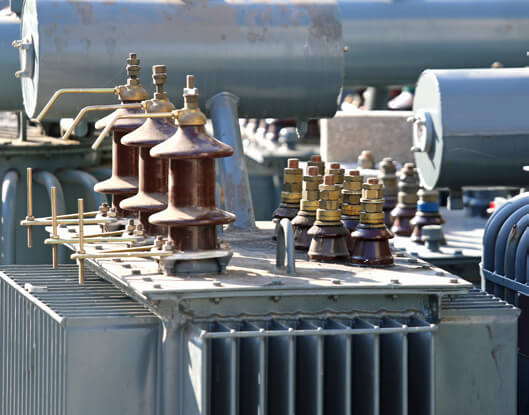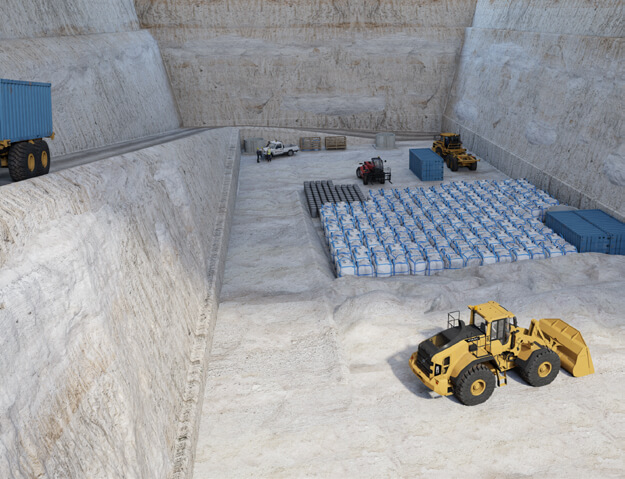PERMANENT ISOLATION OF HAZARDOUS WASTE USING GEOLOGICAL REPOSITORIES
Permanent Isolation (Disposal) of Polychlorinated Biphenyls (PCBs)
THE PROBLEM WITH PCBs
Polychlorinated biphenyls (PCBs) are a group of chlorinated organic compounds that were widely used as coolants and lubricants in electrical equipment manufactured prior to the 1980s. Although the import of PCBs into Australia has been banned since the 1970s, they are still present in some industrial products – particularly transformers and capacitors.
These chemicals are extremely stable and are classified as persistent organic pollutants (POP) under the Stockholm Convention. They are resistant to chemical and biological degradation and, therefore, do not readily degrade in the environment. They are also hydrophobic, resulting in a tendency to bioaccumulate in fatty tissues of living organisms.
PCBs are a Group 1 carcinogen according to the International Agency for Research on Cancer (IARC). Effects of PCB exposure in humans may range from persistent skin irritation to liver damage and damage to the central nervous system.
Previous use of PCBs has led to widespread environmental contamination. Legacy stockpiles have proven difficult to dispose of due to the persistent nature of the materials and limited availability of suitable facilities in Australia.
Fig. 1: High voltage transformers are likely to contain PCBs if manufactured before 1979

HOW ARE WASTE PCBS CURRENTLY MANAGED?
Due to their hazardous nature, PCBs are currently managed via the Polychlorinated Biphenyls Management Plan: Revised Edition 2003 (the PCBs Management Plan). The PCBs Management Plan was produced by the Australian and New Zealand Environment and Conservation Council (ANZECC) and endorsed by the state and territory governments and the Australian Government.
The PCBs Management Plan places restrictions on the handling, storage and disposal of PCBs to ensure they are managed in an environmentally sound manner. Under the PCBs Management Plan, Scheduled PCBs waste (i.e. PCB > 50mg/kg) and liquid PCBs waste must not be disposed in landfill. Additionally, PCB wastes must not be diluted merely to change the classification from scheduled to non-scheduled.
Waste containing persistent organic pollutants, such as PCBs, must be disposed of in such a way that they are completely immobilised or destroyed. Disposal options for PCBs wastes may include:
- Thermal destruction via high temperature incineration, plasma arc furnace, etc.
- Adsorption onto suitable media, which must then be disposed.
- Immobilisation and disposal in a suitable repository.
KEY POINTS
- PCBs are persistent organic pollutants that are listed under the Stockholm Convention.
- PCBs do not readily degrade in the environment and tend to bioaccumulate.
- PCBs are known to cause skin conditions, liver damage, organ damage and cancers.
- Previous use has led to widespread contamination and legacy stockpiles.
DANGEROUS GOODS
PCBs for dangerous goods transportation, are generally Class 9. Specific classification depends on the waste composition and its physio-chemical properties.
Typical classifications expected at Sandy Ridge include:
- UN 2315 Polychlorinated Biphenyls, Liquid, Class 9, PG II.
- UN 3432 Polychlorinated Biphenyls, Solid, Class 9, PG II.
- Wastes that are not subject to the ADG Code requirements i.e. substances with a concentration of less than 50 mg/kg.
IMMOBILISATION AND DISPOSAL OF PCBs
Tellus intends to dispose of PCBs wastes at the Sandy Ridge Facility in accordance with the PCBs Management Plan and the Basel Convention Technical Guideline: Technical guidelines on the environmentally sound management of wastes consisting of, containing or contaminated with polychlorinated biphenyls, polychlorinated terphenyls, polychlorinated naphthalenes or polybrominated biphenyls including hexabromobiphenyl (PCBs, PCTs, PCNs or PBBs, including HBB) (May 2017).
These guidelines outline the environmentally sound methods of managing PCBs and other POPs, including the use of a Specially Engineered Landfill (SEL) for disposal. As a geological repository, the Sandy Ridge Facility exceeds the requirements of a SEL.
The Sandy Ridge Facility will also incorporate an immobilisation treatment process to ensure that wastes meet Tellus’ Waste Acceptance Criteria (WAC), and to provide an additional barrier preventing the migration of hazardous materials over geological time.
Tellus’ immobilisation treatment involves locking the waste into a cementitious matrix and/or adsorbing it onto a suitable material. The process involves mixing the waste with appropriate ratios of binders and kaolin according to one of several formulations that Tellus has developed, to produce a solid, cementitious block. This block must be capable of withstanding the geotechnical conditions of the cell while immobilising the waste and its absorbed liquid.
Tellus conducted a study to develop an immobilisation formulation specific to PCB-contaminated oil. A raw PCB-oil sample obtained for the immobilisation study was found to have a total PCB content of 750,000mg/kg.
A range of formulations were prepared to test the kaolin as a suitable treatment reagent. The ideal formulation was then crushed and subjected to the Toxicity characteristic leaching procedure (TCLP) test to assess the function of the solidification formulation as a man-made barrier.
The leachate generated by the TCLP was found to be PCB-free (based on ANZECC_guidelines) which, taken together with the natural barriers of the geological repository, enables Tellus to accept PCB-contaminated materials for permanent isolation at Sandy Ridge.

THE TELLUS SOLUTION
Tellus is currently developing storage, recovery, and permanent isolation infrastructure in the form of geological repository facilities supported by a “hub and spoke” logistics solution across Australia.

KEY CLIENT BENEFITS
Tellus offers simple, safe and cost-effective storage, treatment and permanent isolation (disposal) solutions for hazardous wastes.
Features and benefits include:
| Quality |
|
| Commercial and risk transfer |
|
| Functionality |
|
| Sandy Ridge availability and innovation |
|
| Regulatory approvals and licensing |
|
| Price |
|
